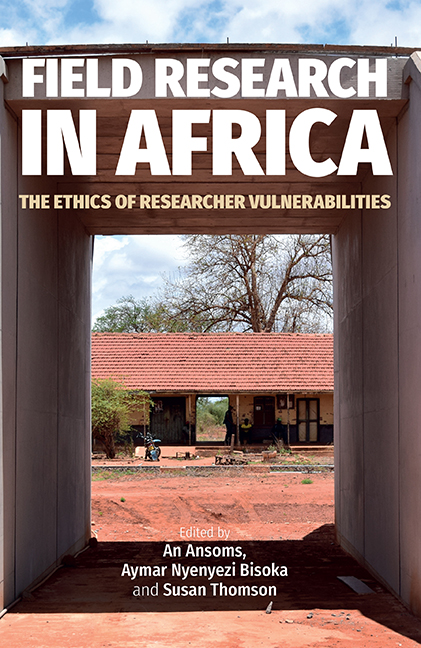Book contents
- Frontmatter
- Contents
- List of Contributors
- Foreword: It is about Us
- Map of Africa showing Fields of Research
- Introduction: Fields of Vision, Emotion as Reflexivity
- 1 Skin Connections: Negotiating Institutional Ethics alongside Insider Identities
- 2 Conducting Sensitive Research ‘At Home’: A Matter of Responsibility
- 3 A Gendered Research Journey: Ethical Dilemmas of an Algerian Immigrant Recovering the Memory of ‘Home'
- 4 Establishing Kinship in the Diaspora: Conducting Research among Fellow Congolese Immigrants of Cape Town
- 5 ‘If they find out, we're dead': Intermediaries, Self-censorship, and Anxiety in Research as an Outsider-Insider
- 6 Looking Behind the Screen: Ethical Quagmires when Accessing Hidden Discourses
- 7 Scholar-Activist? On Relational Accountability and an Ethic of Dissemination
- Conclusion: Theorising Self as Ethical Research Practice
- Bibliography
- Index
4 - Establishing Kinship in the Diaspora: Conducting Research among Fellow Congolese Immigrants of Cape Town
Published online by Cambridge University Press: 10 June 2021
- Frontmatter
- Contents
- List of Contributors
- Foreword: It is about Us
- Map of Africa showing Fields of Research
- Introduction: Fields of Vision, Emotion as Reflexivity
- 1 Skin Connections: Negotiating Institutional Ethics alongside Insider Identities
- 2 Conducting Sensitive Research ‘At Home’: A Matter of Responsibility
- 3 A Gendered Research Journey: Ethical Dilemmas of an Algerian Immigrant Recovering the Memory of ‘Home'
- 4 Establishing Kinship in the Diaspora: Conducting Research among Fellow Congolese Immigrants of Cape Town
- 5 ‘If they find out, we're dead': Intermediaries, Self-censorship, and Anxiety in Research as an Outsider-Insider
- 6 Looking Behind the Screen: Ethical Quagmires when Accessing Hidden Discourses
- 7 Scholar-Activist? On Relational Accountability and an Ethic of Dissemination
- Conclusion: Theorising Self as Ethical Research Practice
- Bibliography
- Index
Summary
MY EXPERIENCE AS an ‘insider’, researching fellow Congolese immigrants of Cape Town, South Africa, has been shaped by a number of challenges in the ‘field’. Over time, I noticed a growing rift between my research participants and myself. Two major factors explain this. The first is what most participants perceived as my advanced level of education, as a doctoral candidate in history. The second is the increasing politicisation of ethno-regional feuds among Congolese transnational communities in Cape Town (Garbin and Godin 2013; Inaka 2016). Thus, my Congolese participants neither accepted me as an insider nor as an outsider. My personal and professional identities merged, as I morphed from being just a fellow Congolese immigrant from the Kivu region to an intellectual woman pursuing her doctoral degree in South Africa.
In this chapter, I discuss the challenges of fieldwork among the Congolese of Cape Town. The first is around the methodological challenges of being an ethnographic ‘inbetweener’ despite my sense of being an ‘insider’ (Milligan 2016). As Unluer (2012, 2) explains, ‘insider-researchers are those who choose to study a group to which they belong’. I considered myself an insider among the Congolese refugee communities of Cape Town because since my arrival in 2004, I too have experienced the financial hardships and xenophobia of South Africa (Neocosmos 2010; Owen 2015; Pugh 2014).
The second challenge relates to the broader issues of ethical practice in ethnographic fieldwork, the one Tolich (2004, 102) describes as having ‘the potential to harm both researchers and their informants’. By ‘harm’, I am referring to my persistence in accessing the research field even when there were signs and feelings of mistrust and avoidance, not just from my research participants, but also from me to them. This is because in some instances, I felt discomfort in their willingness to participate in my research in the sense that their participation could clash with the golden ethical rule of ‘do no harm’ (Mackenzie et al. 2007; Thomson 2013b). Thus, like other researchers who have found themselves in a similar position, I often complied to ‘make active attempts to place’ myself ‘in between’ an insider and outsider in my research fieldwork, a position I sometimes felt was unfairly imposed on me (Milligan 2016, 248).
- Type
- Chapter
- Information
- Field Research in AfricaThe Ethics of Researcher Vulnerabilities, pp. 63 - 84Publisher: Boydell & BrewerPrint publication year: 2021
- 1
- Cited by



